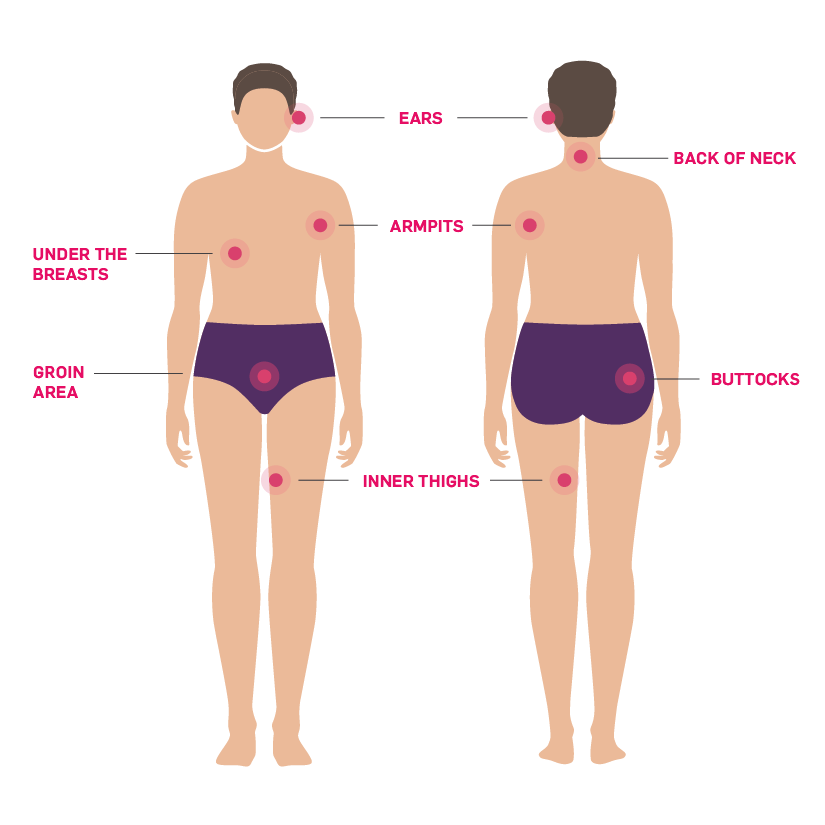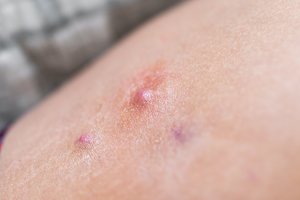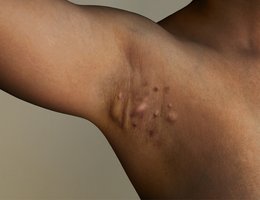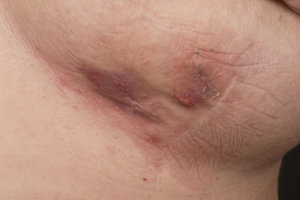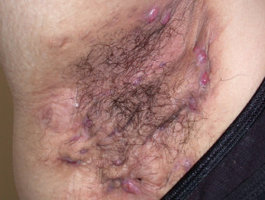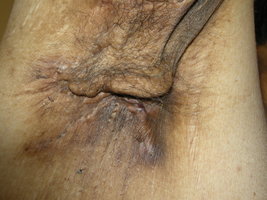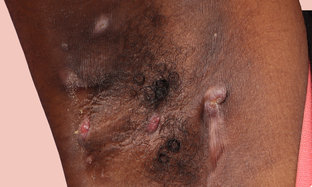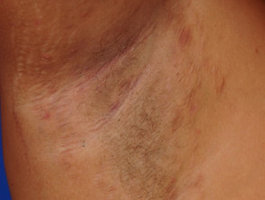
For adults with moderate to severe hidradenitis suppurativa
WHAT IS HIDRADENITIS SUPPURATIVA (HS)?
Hidradenitis suppurativa (HS) is a chronic, or long-lasting, inflammatory skin condition.
HS signs and symptoms can include painful bumps or abscesses, mostly in areas where skin rubs against skin, like the armpits, the groin area, inner thighs, buttocks, and under the breasts. HS abscesses can drain and may lead to tunnels that can leave scars.
Where HS symptoms commonly appear:
When you have HS, your immune system is believed to be overactive and produces too much of certain inflammatory molecules, like IL-17A. Too much IL-17A is thought to contribute to excess inflammation in your body, leading to HS symptoms like bumps and abscesses that can hurt.
What HS looks like
Over time, HS may progress or get worse if left untreated, and may lead to scarring; that's why it's important to understand how HS may progress.
HS can be classified into 3 stages† based on the severity of the symptoms. Scroll through the images to see what HS can look like on different skin tones:
MILD‡
MILD‡
Mild is when there is 1 bump or multiple inflammatory bumps and abscesses, with no scarring or tunnel (sinus tract) formation.
MODERATE
MODERATE
Moderate is when there are multiple abscesses, along with limited tunnels and/or scarring. COSENTYX helps treat moderate to severe HS. Early treatment is important. Talk to your dermatologist about your symptoms and their impact to see if a biologic treatment is right for you.
SEVERE
SEVERE
Severe is when there are multiple or extensive interconnected tunnels, abscesses, and scarring.
†In classifying the severity of your condition, your dermatologist may call these Hurley stages.
‡COSENTYX® (secukinumab) is approved to treat moderate to severe HS.
Think you might have HS?
It's important to find a doctor that can address your symptoms.
Need help starting the conversation with your dermatologist? Use our Doctor Conversation Starter.
HS can affect emotional well-being.
Living with HS can be a long and frustrating journey. Often, dealing with HS symptoms can make everyday activities a challenge. Feelings of anxiety and depression are common with most chronic conditions, including HS. Approximately 43% of patients express depression.
Be sure to talk to your dermatologist about how your HS is making you feel, beyond just the physical symptoms.
Facts about HS

One in 100 people may be affected by HS.
Up to 40% may have a family member with the condition.
It takes an average of 10 years to get an HS diagnosis, so it's important to be open with your dermatologist to help shorten that time frame.

HS is not contagious or due to poor hygiene.
HS usually begins when people are in their 20s, but it can start as early as puberty or as late as their 50s.
HS is mostly seen in women and disproportionately affects people of color. Hormonal changes may contribute to HS symptoms, and can lead to HS flares, making the symptoms worse.
Other factors that may worsen HS symptoms include weight and smoking.
Hear more about HS
Hidradenitis suppurativa (HS) can often be misdiagnosed. Learn the real truth about HS from real people with HS.
Frank, Lindsay, and Lily are actual patients and have been compensated for their time. Individual results may vary.
Lily gets real about HS
There are many misconceptions about hidradenitis suppurativa (HS). Lily helps set the facts straight about HS.
Lily is an actual patient and has been compensated for her time. Individual results may vary.
You are here
Watch as 3 people living with HS meet at a crossroads in their journeys to share their stories and discuss where to go next.
Where will you go next with HS?
The road to managing HS can feel long, confusing, and filled with unexpected challenges. But knowledge about biologic treatment options like COSENTYX® (secukinumab) can help forge a new path by taking on HS from the inside out.
FIND A DOCTOR
Real people taking COSENTYX are seeing results. Could you be one of them?

